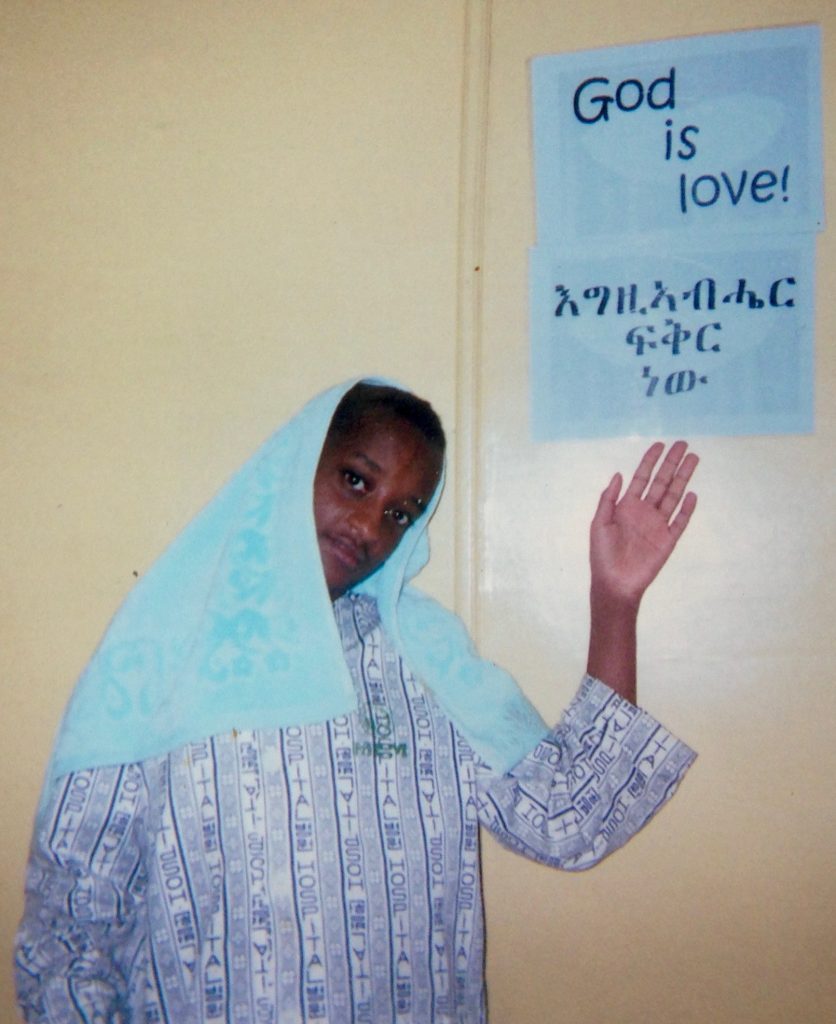I discovered neighbor love in all of its raw pain and radical hope through a suffering boy on the streets of Addis Ababa. His name was Eyob (Amharic for Job), and it was Saturday, May 1, 2010.
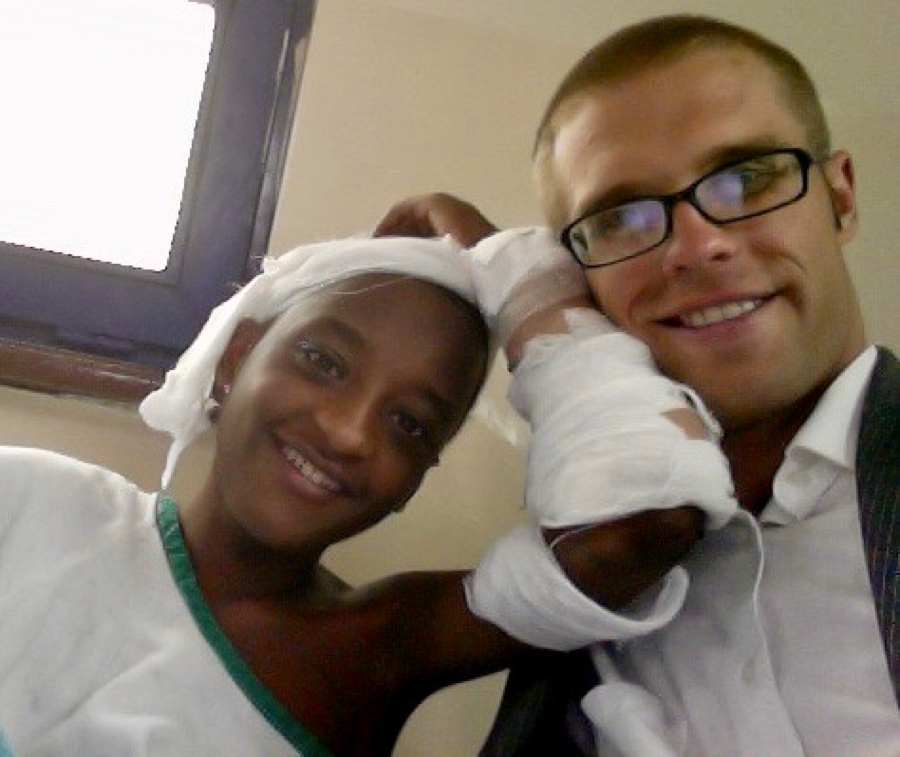
With Eyob after one of his many surgeries in 2010
The Agony of Othering
Eyob met me at a beautiful and painful time in my life.
I was preparing to get married to Lily in Addis Ababa and then to start my PhD at the University of Chicago. At the same time, I was aching with the grief of othering – our tendency to see other people as unrelated or less than ourselves.
The leaders of the church I loved and hoped to serve for the rest of my life had excluded me. They did so because my then-fiancée Lily attended another congregation across town. To them, she was “other,” and our relationship couldn’t be accepted unless she “submitted” to them. When Lily and I refused to separate, they removed me from leadership and shunned me from the community. It felt like an excruciating spiritual divorce.
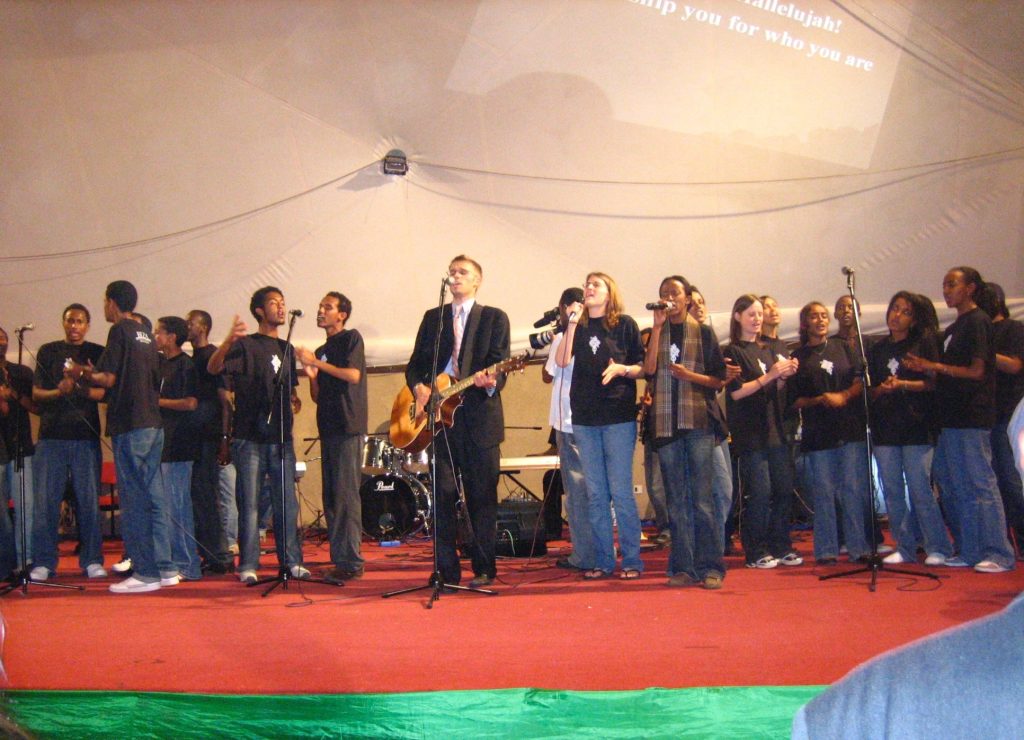
The Beza choir at the Ethiopian Millennium celebration (2007)
During this disorienting time, I was asked to preach at the International Lutheran Church. Their American pastor had found Addis too hard and left abruptly. Little did I know, that sermon was my first interview. I reminded the community, “All is not right in the world!” and encouraged us to struggle against evil with God’s nonviolent “armor” – truth, peace, and justice. Soon after, the congregation asked me to become their interim pastor.
The church was on the other side of Mexico Square, one of the busiest roundabouts in Addis Ababa. On my commute to work, I had to walk through this huge intersection of humanity. Each day, I passed many suffering people: lepers with lost limbs, polio survivors with bowed legs, and homeless children, women, and elders. These people sat on the sidewalk and begged for help from passers-by, including me.
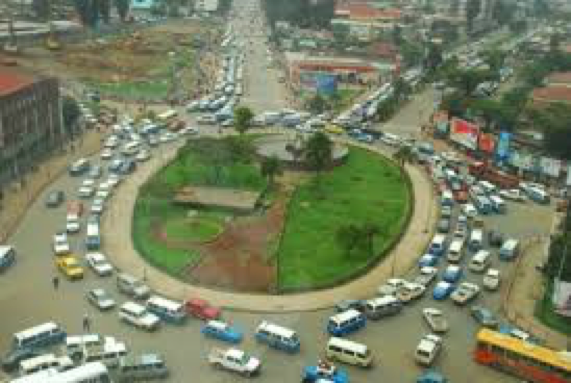
Mexico Square circa 2010
I desperately wanted to help these people. But I felt paralyzed by the enormity of the needs and didn’t know what to do. So, day after day, I played the part of the priest in Jesus’s famous parable about the good Samaritan: I walked past them and went to church.
As I led this humble congregation, my soul and the world often felt God-forsaken. I was haunted by questions that seemed as large as the universe and as sharp as razor blades: How can I believe that God is real and loves us when so many people are suffering around me? How can I preach God’s love but walk past my suffering neighbors? Is there any hope?
I kept a pocket knife in the table next to my bed. In some of the dark nights of my soul, I was tempted to call it quits alone in my room.
That was when Eyob met me.
Christ in the Other
It was a sunny Saturday afternoon, and I was having lunch with friends at a café called Betena. Betena was directly across the street from the Ethiopian Graduate School of Theology. (Six years later and inspired by Eyob, I would become a professor of theology and ethics there.)
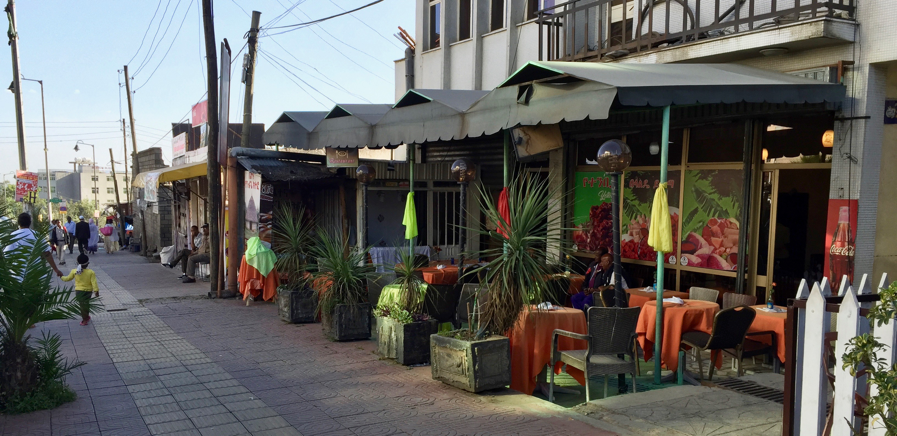
Betena Cafe in Addis Ababa
As my friends and I ate, a skinny boy wearing a dirty hood approached our table. He begged for money, and we politely said no. Without protest, he turned away and walked up the street.
But as he turned, his hood slipped off. In that moment, I saw that he had a horrific wound on the back of his head. A silent war began raging within me: “Should I continue sitting with my friends and finish my lunch? Or should I get up and help this boy?”
It was one of those strange moments in which I unmistakably heard Jesus speak to me. The inner voice said, “Andrew, if you say no to him, you’ve said no to me.” It was my personal Matthew 25 moment. In that story, Jesus taught, “Whatever you did to the least of these, you did to me.”
I got up, ran down the road that leads to Mexico Square, and found him.
I was devastated by what I saw. Eyob’s brain was visibly quivering through the oozing wound on the back of his head. The sun was scorching, and he was stumbling through a massive city all by himself.
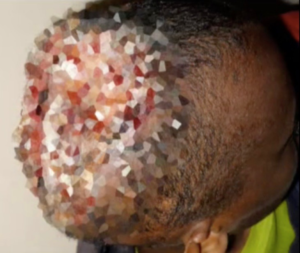
A pixelated image of Eyob’s head wound
Eyob had fallen into an open cooking fire as a small child in his family’s rural home. His head was badly burned, but his wound was never treated due to their poverty. Eventually, his wound became so putrid that his family removed him from school and hid him in their home for years like a shameful secret. Eyob had become an “other” in his community.
At last, his family became desperate. They put Eyob on a pickup truck for Addis and told him to beg for help or die. And that’s how I met him – begging for help and dying.
Christian Othering and Christ’s Neighbor Love
On the following Monday, I took Eyob to the Korean Hospital, one of the most respected medical centers in Addis at the time. We waited in the lobby from morning until night, but, each day, we were told, “Come back tomorrow.” Finally, on Friday night, my anger boiled over. I barged into the hospital director’s office and demanded that Eyob be seen immediately.
When Eyob was finally admitted later that night, the nurse exclaimed with disgust, “In Jesus’s name!” She then told me, “Take him back to the street where he belongs!” I couldn’t believe my ears: a Christian nurse in a Christian hospital was taking the name of Jesus on her lips to tell me to abandon a suffering child to the streets like a dog. This is the deadly power of othering.
But we didn’t give up.
Thankfully, a burn specialist named Dr. Einar Eriksen was working at the hospital and intervened. In the months that followed, Dr. Einar led the extraordinary effort of removing Eyob’s cancerous flesh, cleaning his wound, and grafting skin from his arms and legs onto his head. Through several life-threatening operations, Eyob survived.
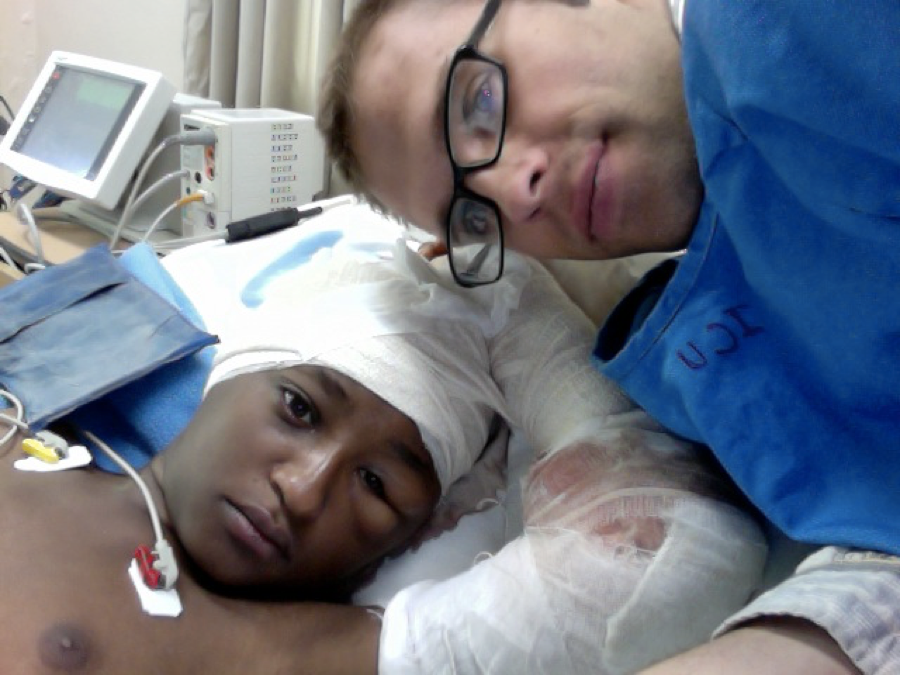
Eyob after one of his skin grafts
Eyob was tireless. He spent weeks with his left wrist attached to his head, so the blood vessel from his arm would flow into his newly grafted skin and keep it alive. I had never spent so many hours, days, and weeks in a hospital before. But with Eyob I discovered the mysterious truth of Dietrich Bonhoeffer’s words in his meditation Pastoral Care for the Sick and Dying:
“The person who is plagued by pain or disgusting illness experiences and suffers the world in a special way. He resembles the One who bore all our sicknesses and was so despised that people turned their eyes from him… Among the sick, we are closer to Jesus’s own sufferings on the cross than we are among the healthy. Here we recognize the world better. Spending time with the sick is the proper way for the pastor to spend time.” Dietrich Bonhoeffer
Eventually, Lily, my friends, and I heard words from Dr. Einar that echoed in our ears like heavenly music: “Eyob can live a normal life!” We were elated, and I wrote an update on June 6, 2010 titled “The Resurrection of Eyob.” The next month, Lily and I threw a feast at our apartment after we were married, and Eyob was our guest of honor.
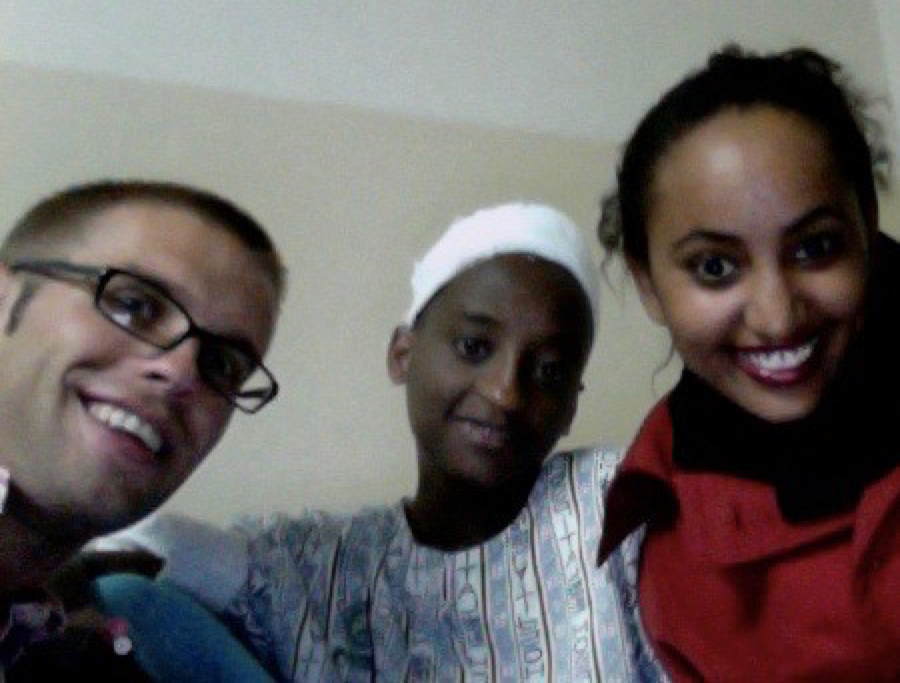
Celebrating after our wedding with Eyob
But a normal life for Eyob was not to be. As he went through rehab, golf-ball sized tumors started appearing under his newly grafted skin. Further tests were run. And finally, the doctors discovered that Eyob had terminal brain cancer. They advised that more operations would only increase Eyob’s suffering.
With many mixed emotions, we helped Eyob return his family in Ethiopia’s southern countryside. There he died in early 2011 around the age of fourteen.
Eyob’s Witness of Hope: “God Is Love”
Eyob’s life and death taught me both the deadly power of othering and the healing power of neighbor love. If someone had seen Eyob as a precious neighbor and acted a few years before, Eyob might still be alive today. But the people around him looked away from his suffering like I did in Mexico Square. Or, like the Christian nurse at the Korean Hospital, they saw him as a dehumanized “other” destined for the streets. Ultimately, othering killed Eyob far more than cancer did.
I am struck by a small detail in Jesus’ story of the good Samaritan. Jesus says that all of the characters “saw” the suffering person on the roadside, including the religious leaders who simply walked by. But the hated Samaritan saw him with compassion. And so he came close to him, discerned his needs, and acted with urgency (Luke 10:33).
According to Jesus, the othered Samaritan was the true “neighbor.” With his compassion, he embodied God’s eternal, undying life. Jesus promises, “Do this, and you will flourish” (Luke 10:28).
Meeting Eyob shattered my heart with grief. I can’t count all the times that I have wept over his suffering and death across the years. But through the tears, Eyob has become my witness of hope for the flourishing Jesus promised. He’s what Mother Teresa called a “saint of darkness” who was “absent from heaven – to light the light of those in darkness on earth.” With Eyob I discovered the truth of Jesus’ words for myself: we meet Christ in our suffering neighbors and they point us to God’s everlasting love (Matthew 25:31-46).
Eyob had astonishing endurance in the face of excruciating pain and rejection. He never complained, never pitied himself, and never responded with anger toward others, including the nurse who ironically rejected him “in Jesus’ name.” On one of the long days when we sat waiting to be seen at the hospital, Eyob asked to use my phone and texted his brother Dawit. Later, when I read his text, Eyob had sent the core message of his short life with just three words: “God is love.”
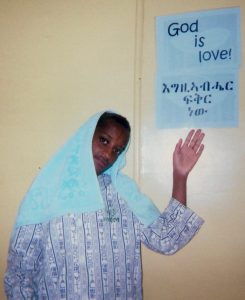
Eyob pointing to his life’s core message in English and Amharic: “God is love”
After his seemingly endless operations, Eyob spent several months in the hospital’s burn rehab center. Watching how he lived there moved me profoundly and modeled the neighbor love Jesus promised never dies. Whenever we brought Eyob gifts – toys, food, sweets – he would immediately get out of his bed and start sharing them with the other children recovering from their burn wounds. His poverty became a place of generosity, mutual dignity, and healing laughter.
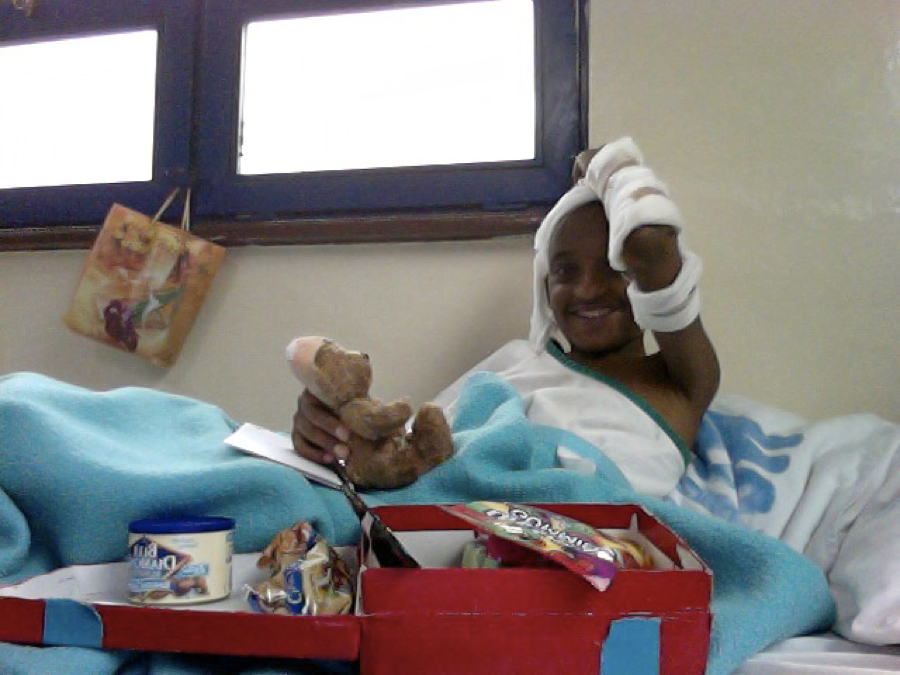
Eyob opening gifts in the rehab center
Even as Eyob suffered, he embodied an unwavering hope. He told me that his dream was to become a pastor and professor. I was astonished, because this was also my dream. He wanted to tell his story to stadiums full of people and inspire them to love “others” who suffer like he did.
When I found out that Eyob had passed away a few months later, I knelt down in my apartment in Chicago and wept uncontrollably. The grief was overwhelming. But I knew that Eyob was safe in God’s undying love and that I had rediscovered my life’s calling: to become an advocate of neighbor love with and for our world’s Eyobs.
Rediscovering My Vocation
A few years later in 2015, I walked the aisle at Rockefeller Chapel to receive my PhD diploma in religious ethics from the University of Chicago. During the ceremony, I held Eyob’s picture over my heart.
That night, I told our dinner guests Eyob’s story and explained why Lily and I intended to move back to Ethiopia. We had established the Institute for Faith and Flourishing with the mission of inspiring people to see, serve, and love others like Eyob as their neighbors.
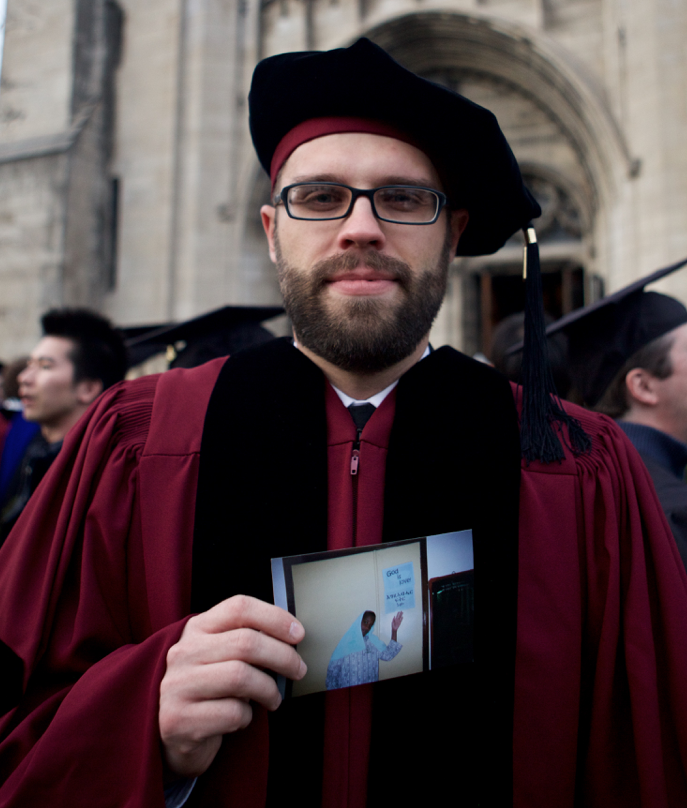
Graduation day at UChicago in December 2015
A few weeks later, January 4, 2016 was one of the most astonishing days in my life. In my book Flourishing on the Edge of Faith, I call it our liberation day.
At the time, Lily and I didn’t have any savings, and I had agreed to teach at the Ethiopian Graduate School of Theology without a salary. My anxiety over how this would (or wouldn’t!) work was escalating. But on that day, I received a pledge of $75,000 to help us begin our work.
I was also given a video message that Eyob had filmed for me five years before but that my friend had forgotten to give me. Back in 2010, in his final message to me soon before his death, Eyob quoted the Prophet Isaiah:
“I will go before you and will level the mountains; I will break down gates of bronze and cut through bars of iron. I will give you hidden treasures, riches stored in secret places, so that you may know that I am the Lord.” (Isaiah 45:2-3)
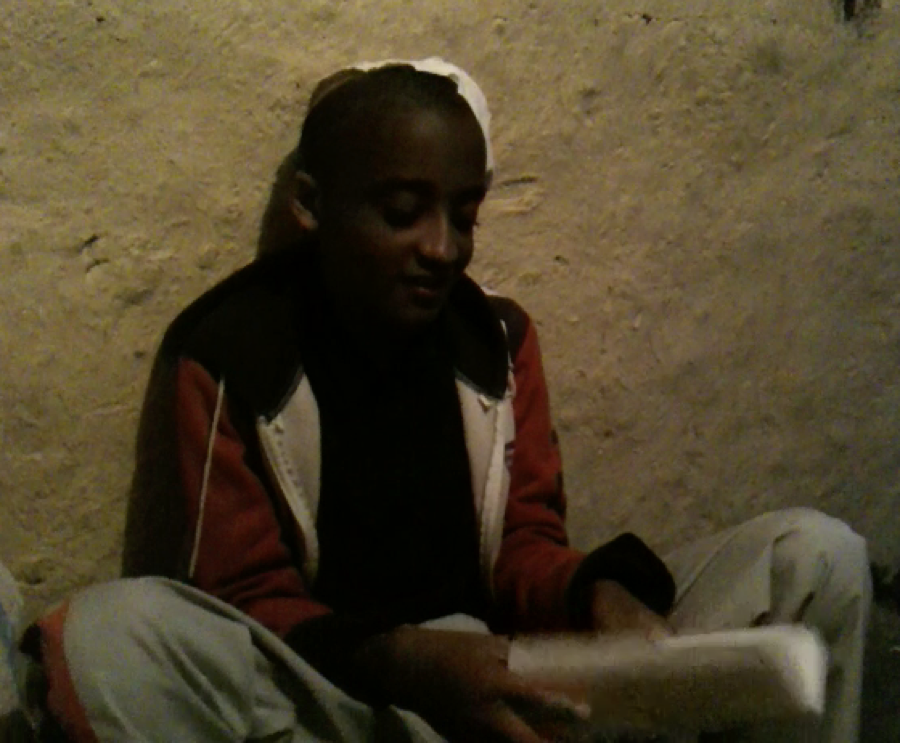
Eyob speaking his final message to me in a video recording from 2010
Then Eyob summoned me with words that I still carry in my heart now:
“My dear brother Andrew, whom I love more than anything, and my sister Lily, we are one in the blood of Jesus Christ. Be strong and work hard, and God will be with you and support you! Till you go to heaven – till you receive the reward from the hand of God – be strong and serve God intensely. May peace be with you.”
As Eyob said these words, I could hear beautiful Orthodox chanting in the background. The choir sang, “The healer of the world! Jesus, praise be to you, the healer of the world!”
Neighbor Love Now
Over the past ten years, God as provided as Eyob promised me God would. And as Eyob urged me, I have been working hard to bear witness to the healing power of neighbor love that I experienced so profoundly with him. There has been more grief but also beautiful moments of healing and hope.
In 2016 when I was teaching at the Ethiopian Graduate School of Theology – across the street from where I first me Eyob – I told his story in my Christology course. Eyob’s story so powerfully illustrates Jesus’ teaching in Matthew 25 that we meet Christ in “others” we easily overlook.
Not long after, my student Tsiyon came to my office. She said that a poor neighbor boy named Ammanuel had been badly burned by a pot of boiling water in the slum where he lived. It was an accident so similar to Eyob’s. Inspired by his story, Tsiyon had acted immediately, and little Ammanuel was able to heal after he got the care that he needed. She told me, “Ammanuel is rescued. Christ in others has saved one beautiful child. Glory to God.” We took a picture together to mark that sacred moment.
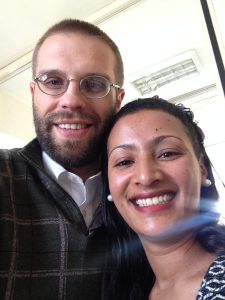
With my student Tsiyon at EGST in 2016
In the following years, I was delighted to tell Eyob’s story in my addresses to new cohorts of Ethiopian doctors at the Korean Hospital where Eyob received care years before. With tears, I told them about the nurse who had othered Eyob. Then I charged them to practice neighbor love with the Eyobs around us who so desperately need healing.
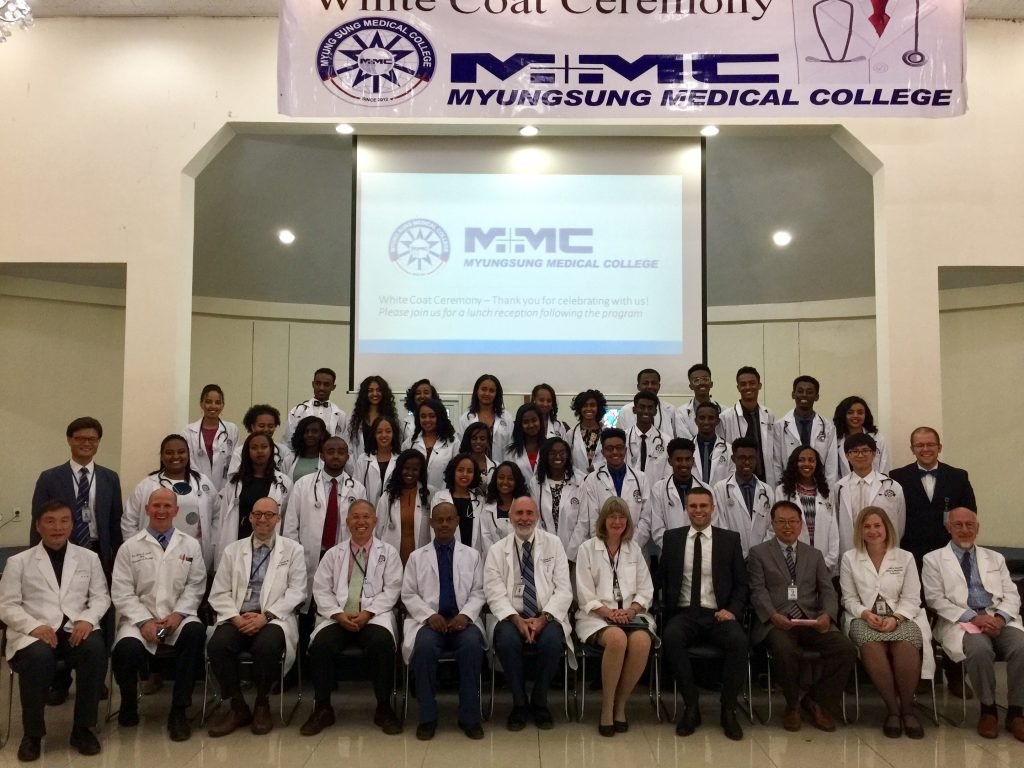
Telling Eyob’s story at the white coat ceremony at the Korean Hospital in Addis
Telling Eyob’s story to a church of 5,000 people in southern Ethiopia was also incredibly special. The church was just a few miles away from the village where Eyob grew up, fell into that fire, and ultimately died. I unpacked Jesus’ parable of the good Samaritan and urged this Christian community to resist othering and to love the Eyobs who suffer around us.
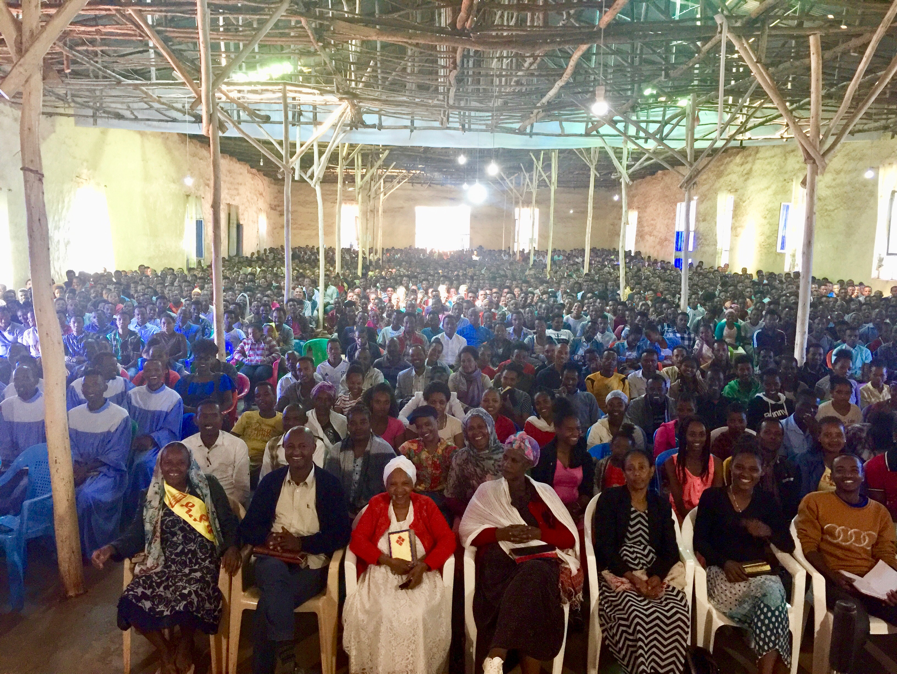
Telling Eyob’s story at a church in Wolaita Soddo, Ethiopia
Now in 2025, I’m delighted to dedicate my next book to Eyob. It’s called Reviving the Golden Rule: How the Ancient Ethic of Neighbor Love Can Heal the World. This book begins with Eyob’s story and narrates some of the Neighbor-Love Movement that I cofounded in Ethiopia in 2019. Chapter by chapter, Reviving the Golden Rule introduces readers to the historical origins of neighbor love, how it evolved across time and space, and how we can continue this healing movement today.
 I hope you’ll read this book and join me in continuing the neighbor-love movement in the ways you can in your own context. Eyob’s story reminds us of the urgent stakes of this love but also the eternal hope that it offers us. Even the most hideous wound that would drown us in despair can open us to an ocean of divine love that never truly dies.
I hope you’ll read this book and join me in continuing the neighbor-love movement in the ways you can in your own context. Eyob’s story reminds us of the urgent stakes of this love but also the eternal hope that it offers us. Even the most hideous wound that would drown us in despair can open us to an ocean of divine love that never truly dies.
As Eyob encouraged me, may we “be strong and work hard” that others may live. We too can become saints of darkness with the Eyobs and Ammanuels of our world.
There is hope when we love our neighbors as ourselves
***
I originally published this story in March 2019. I lightly updated it in May 2025. If you would like to contribute to the Institute for Faith and Flourishing and help us continue our work, please visit our website.



